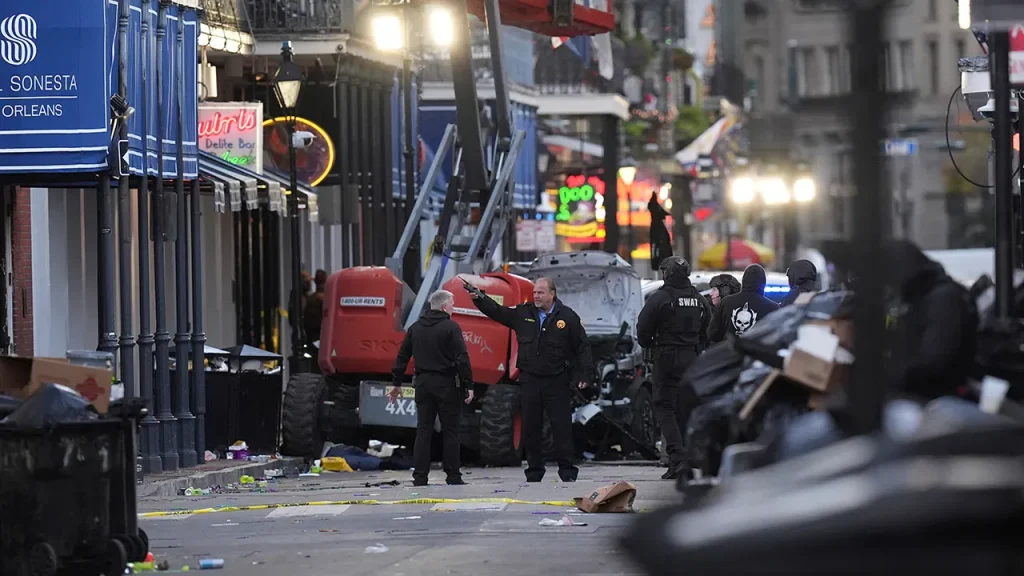The vibrant atmosphere surrounding the College Football Playoff quarterfinal clash between No. 2 Georgia and No. 3 Notre Dame at the Caesars Superdome in New Orleans was tragically shattered by a horrific act of violence in the early hours of New Year’s Day. An unidentified driver deliberately plowed a vehicle into a throng of revelers celebrating the new year on Bourbon Street, a renowned thoroughfare in the heart of the city’s historic French Quarter. The devastating attack claimed the lives of at least ten individuals and left more than two dozen others injured, casting a somber pall over the highly anticipated sporting event.
The incident, which unfolded as thousands of college football enthusiasts converged on New Orleans for the Sugar Bowl matchup, was immediately labeled an act of terror by the city’s mayor and is currently under investigation by the FBI. Authorities swiftly responded to the scene, exchanging gunfire with the attacker, who ultimately succumbed to injuries sustained during the confrontation. Two law enforcement officers were also struck by gunfire during the exchange. The discovery of improvised explosive devices at the scene further heightened concerns, with investigators working diligently to ascertain their viability.
The tragic event sent shockwaves through the city and the broader college football community, prompting expressions of grief and solidarity from various quarters. Allstate Sugar Bowl CEO Jeff Hundley issued a heartfelt statement expressing condolences to the victims and their families, assuring the public that organizers were collaborating closely with local, state, and federal authorities to address the situation and ensure the safety of attendees. The incident inevitably raised serious questions about security measures surrounding the game, scheduled to take place later that day at the Superdome, a venue with a capacity exceeding 80,000 spectators.
Despite the harrowing circumstances, authorities maintained a resolute stance, affirming their commitment to ensuring the safety and security of both residents and visitors. During a press conference held Wednesday morning, Police Commissioner Anne Kirkpatrick conveyed a sense of determination, emphasizing the importance of allowing the city to continue its celebrations while assuring the public that robust security measures were being implemented to safeguard the Superdome and surrounding areas. This unwavering resolve to proceed with the game reflected a desire to preserve a sense of normalcy and resilience in the face of adversity.
The New Orleans Police Department, in its most recent statement, confirmed the grim toll of the attack, reporting that the driver had intentionally driven through the crowd, resulting in the deaths of at least ten individuals and injuries to 35 others. The suspect’s identity remained undisclosed at the time of the report, pending further investigation. The FBI’s involvement underscores the gravity of the incident, with the agency actively pursuing all avenues of inquiry to determine the motive behind the attack and any potential connections to broader terrorist networks.
The tragic events of New Year’s Day served as a stark reminder of the vulnerability of public gatherings and the ever-present threat of violence. The Sugar Bowl, typically a celebration of athletic prowess and collegiate spirit, was irrevocably marked by the tragedy, forcing a confrontation with the difficult realities of security concerns in the modern era. Despite the somber backdrop, the game proceeded as scheduled, offering a poignant juxtaposition of celebration and mourning, a testament to the resilience of the human spirit in the face of unimaginable loss. The incident will undoubtedly prompt a reevaluation of security protocols at large public events and reinforce the need for continued vigilance in safeguarding public safety.

